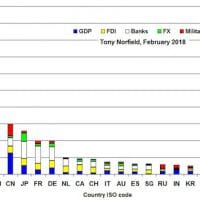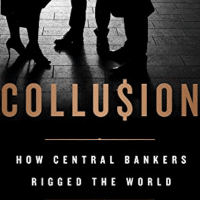-
Index of power
he overall picture shows a small number of countries, led by the U.S., towering over the rest. Only 33 countries out of 180 have an index that is more than 1% of the U.S. index number! In the chart, the columns for these would look like the x-axis, so I have shown just the top 20 countries. Of those, only five are close to or above 20% of the U.S. number: the UK, China, Japan, France and Germany.
-
North Korea in the age of Trump
On January 23, Hyun Lee, the managing editor of ZoominKorea, and I spoke at a UCLA Center for Korean Studies sponsored event titled “North Korea in the Age of Trump.” I went first, offering a critical perspective on U.S. foreign policy towards Korea, North and South. Hyun Lee then talked about the importance of Science […]
-
Russian debt repudiation, 100 years on
One achievement of the Russian revolution that is often ignored is the fulfillment of a promise made by the Russian revolutionaries in 1905: that all debts contracted by the Tsarist regime that had been overthrown some eleven months earlier were cancelled.
-
New book reveals Israel’s covert operations, including nearly 2,700 assassinations
A new book unveiled this month sheds light on Israel’s covert operations of state-sponsored killings.
-
There is no such thing as a natural disaster
“Instead of considering these [events] as natural disasters we should be calling them humanitarian disasters with a natural trigger, where this natural trigger ignites and exaggerates the structural inequalities that capitalism produces along racialized, gendered, and class lines.”
-
Introduction to the material constitution
In a couple of previous posts on Legal Form, Rob Hunter has reminded us of the importance and aptness of a Marxist approach to the analysis of public law. Hunter’s intervention could not be more timely: even after the economic and financial crisis, and despite the comeback of Marxism as a relevant intellectual source at least within certain legal domains (think, for example, of international law) [1], there has not yet been a Marxist revival in constitutional studies. One possible explanation for this phenomenon (though likely not the only one) is the discredit and almost total obliteration of the best-known Marxist contribution to constitutional studies: Lassalle’s notion of the material constitution.
-
Trump lays bare U.S. support for ethnic cleansing of Palestine
For 25 years, since a fateful handshake between former Palestine Liberation Organisation (PLO) leader Yasser Arafat and Israeli PM Yitzhak Rabin on the White House lawn ushered in the Oslo Accords, supporters of a single, democratic and secular state between the Jordan River and the Mediterranean Sea have been pilloried.
-
NYT joins campaign to purge the term, “white monopoly capital” in South Africa
The New York Times, the world’s premier journalistic purveyor of a “fake,” imperial, and profoundly white capitalist world view — masquerading as all the news that’s fit to print — wants us to believe that a now-bankrupt London-based public relations firm is behind South Africa’s regime-shaking debate over the rule of “white monopoly capital.”
-
U.S. and Argentina threaten to ban Venezuelan oil
U.S. Secretary of State Rex Tillerson is threatening to ban the import and export of oil and crude products from Venezuela into the U.S. to pressure President Nicolas Maduro to “return to the constitution.”
-
Tomgram: Nomi Prins, how to set the economy on fire
There’s no way to measure just how cheery this period really is — not if you’re the CEO of a major company. Just as the World Economic Summit was opening in Davos, Switzerland, and President Donald Trump was flying in to put his mark on the moment, PwS, a global consulting firm, released its annual survey of 1,300 CEOs.
-
The return of great power rivalry
Two documents published by the U.S. government in the past two months spell it out loud and clear: the U.S. is on the warpath against emerging big power rivals China and Russia.
-
An apology for imperialism in a colourful package
We all know that Hollywood movies are fictional, right? Even the ones “based on actual events”? But at some level, if a fictional film references actual history and includes stunning visuals, great acting, and a powerful musical score, it can become accepted and internalized as “the truth.”
-
Thomas Friedman justifies slaughter of Arab civilians by ‘crazy’ Israel
Thomas Friedman had a column in the New York Times yesterday justifying the Israeli slaughter of Arab civilians. Israel needs to go “crazy” in its confrontation with Hezbollah and Iran in Lebanon and Syria because, “This is not Scandinavia.”
-
Signs of economic trouble ahead
The current expansion has gone on for 102 months. Only the expansions from March 1991 to March 2001 (120 months) and from February 1961 to December 1969 (106 months) are longer. Unfortunately, growth during this expansion has been slow and the gains have largely gone to a very few. And there are signs of economic trouble ahead.
-
‘You can’t watchdog government if government’s watching all your communication’
“Congress Advances Bill to Renew NSA Surveillance Program After Trump Briefly Upstages Key Vote” was the headline on a Washington Post article. The lead described the bill as reauthorizing “the government’s authority to conduct foreign surveillance on U.S. soil.”
-
Trump wants $716 Billion by 2019 to pursue “aggressive defense” against China
As if to highlight the American government’s real position on world peace, and Trump’s true position on Russia, just as peace talks between North and South Koreas are reaching their zenith (peace talks that occurred just as the North developed a ballistic missile that can deliver a nuclear payload to the U.S., and the promise of Mutually Assured Destruction- a coincidence, surely) it seems Trump is getting ready to ask for a sharp increase for the 2019 US defense budget.
-
The Post should be viewed by current editors of The Post
I was afraid that The Post would give us a Hollywood film version of the publication of the Pentagon Papers and manage never to say what was in the Pentagon Papers. I was afraid it would be turned into a pro-war movie.
-
Bolshevism, Balfour and Zionism: A tale of two centenaries
November 2017 marked the centenary of two of the most decisive events in the twentieth century: the Bolshevik-led revolution in Russia and the Balfour Declaration in Britain.… At loggerheads were two mutually exclusive political objectives: the one to promote worldwide, anti-imperialist revolution; the other, to further British imperial interests in the Middle East.
-
Mainstream media and imperial power
Noted journalist and filmmaker John Pilger’s collection of work has been archived by the British Library, but deep-rooted problems of Western media create an increasingly difficult landscape for ethical journalism, as Pilger explained in an interview with Dennis Bernstein and Randy Credico.




















